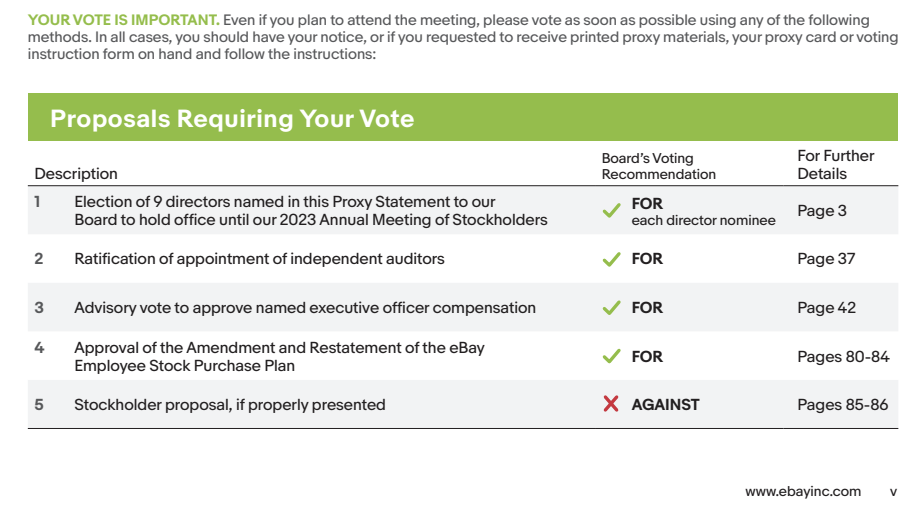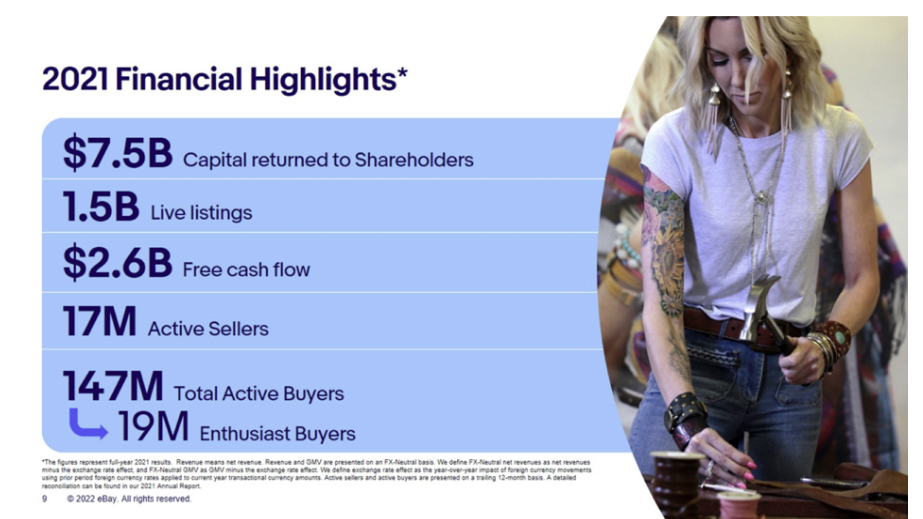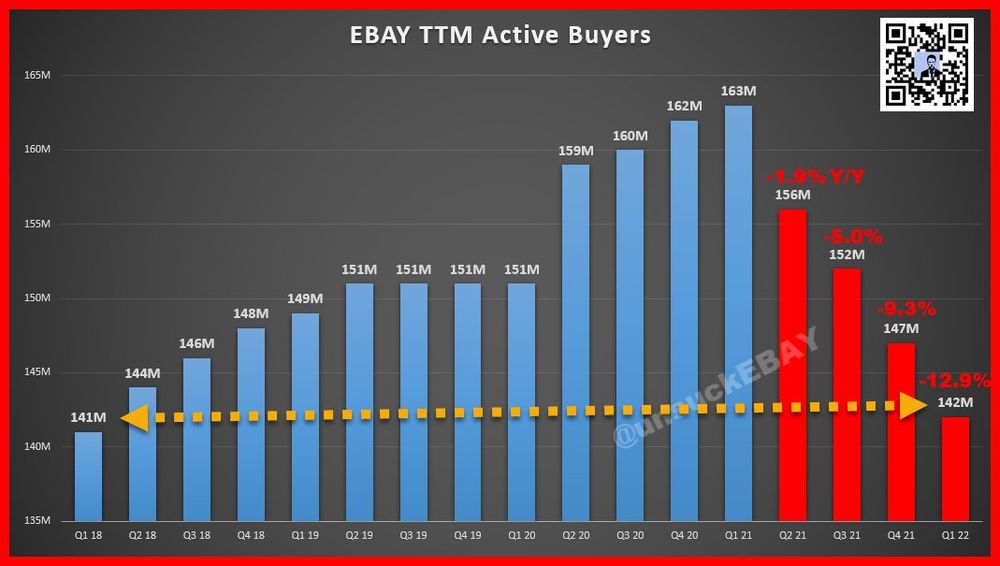eBay Annual Shareholder Meeting 2022 - Commentary
eBay held their annual shareholder meeting on June 8, 2022, taking up important issues such as the election of directors to the Board, appointing PricewaterhouseCoopers LLP as independent auditors, approval of named executive officer compensation, approval of the Amendment and Restatement of the eBay Employee Stock Purchase Plan, and one stockholder proposal.
A replay of the meeting can be found here:

The stockholder proposal came from John Chevedden who sought to amend company governing documents to give the owners of a combined 10% of outstanding common stock the power to call a special shareholder meeting.
Preliminary voting results fell in line with the board's recommendations on all 5 points, as laid out in the company's most recent proxy statement with 1-4 approved and the stockholder proposal not approved.

CEO Jamie Iannone then gave prepared remarks, mostly rehashing prepared remarks from recent quarterly earnings calls and Investor Day presentations.
Jamie gave video in listings, Scan to List image recognition, and the Unified Listing Experience as examples of tech-led reimagination success stories from 2021.
However, sellers might be less enthusiastic about just how much of a "success" those initiatives have been.
Video in listings got off to a rough start with reports of long processing and approval times and loading errors/lag in the listing process.

The Scan To List feature works well enough but trading card sellers have been frustrated with the lack of expansion to include more categories.
By May 2021, it supported Pokémon, Yu-Gi-Oh! and Magic The Gathering collectible cards and over a year later...it still only supports those cards.

eBay is missing a HUGE opportunity by not having sports cards supported in the Scan To List feature - especially with recent developments with their Collection and Pricing beta features in the app and the new eBay Vault program for high end trading cards.


Scrappy up and comer startup Collx has been making waves in the trading card world recently for doing exactly what eBay's tech led reimagination has failed to do - create an app using image recognition tech to scan, price check, and sell sports trading cards.

The Unified Listing Tool was almost universally panned by sellers when it first rolled out in 2021, forcing then VP Seller Experience Harry Temkin to walk back many of the changes.

Unfortunately over the last year, it hasn't gotten much better and sellers were recently outraged over being forced to use the new listing experience when eBay retired the old version with very little notice.

If these are the best examples Jamie can come up with, that does not bode well for the tech-led reimagination of the platform.
Jamie also pointed to financial highlights from 2021 as a sign of success showing his plans for the platform are working - specifically calling out 147M total active buyers as a positive.

What that slide fails to show is a year over year comparison which would show not only did eBay fail to hang on to gains from the pandemic ecommerce boom, they have in fact lost gains made in the last four years and are almost back to Q1 2018 active buyer levels.

Again, if that is supposed to be a sign of success, I'd hate to see what Jamie would call failure.
The Q&A segment ended with a very interesting question about sellers being charged fees on sales tax.
As a seller if I sell an item to a buyer in Delmar, Delaware vs if I sell the exact same item at the same price to a buyer in Delmar, Maryland, literally across the street, I pay much higher final values fees for the buyer in Maryland. That is unfair to sellers.
Can you please shift the burden of paying final value fees on sales tax to the buyers? Or in the alternative, can we eliminate final value fees charged on sales tax at all?
Jamie gave a very vague non-answer, making it sound as if eBay has no control over the fees charged on tax and incorrectly stating sellers experience lower fees.
So first we collect sales tax as we're required to do on a state by state basis associated with what all the specific sales tax rules are and it's been true on the site for quite some time.
You know as we moved to our new managed payments by eBay, our goal was to simplify the overall fee structure and combine the payments fees with the final value fees and having one simple structure against the total amount paid.
In the vast majority of cases we expect sellers to be paying less under this structure than they were before where they were paying a separate fee for payments and separate fee for final value fees.
He then went on to talk about reducing unpaid items and other supposed benefits of Managed Payments (which had nothing to do with the question).
To the first point about "simplying" the fees - creating one fee for both payments and sales commission may be simpler for eBay, but it isn't for sellers.
Since sellers have no idea where the eventual buyer will be located, thus what tax rate will be applied, it is absolutely impossible to know up front how much the total fee will be.
eBay recently expanded this policy of calculating fees on total including shipping and sales tax to Promoted Listings ad fees, so now sellers are similarly in the dark about how much they will pay for ads.

This loss of transparency makes things infinitely more complex for sellers, not simpler.
Jamie also doesn't mention that eBay is the only comparable marketplace that charges such high fees on sales tax amounts.
PayPal and most credit card processing companies typically have fees in the 2-3% range on the total including sales tax.
For seller fulfilled orders, Amazon does not charge any fees on Amazon collected Marketplace Facilitator taxes. If the seller has direct tax collection obligations and opts to use Amazon's tax calculation service, a 2.9% processing fee applies to the tax amount only, separate from Amazon's referral fee on the item price + shipping.
Etsy applies the 3% payment fee to tax, but not the 6.5% transaction fee in US and Canada.
Industry standard would be in 2-3% range, not the average 8-14%+ on eBay, depending on category.

As far as sellers seeing lower fees with Managed Payments, I did a cost comparison with PayPal back in March 2021 that showed in some situations sellers would in fact be paying more in fees under the new program.
Keep in mind, this was over a year ago and there have been multiple fee increases and several states added to eBay's marketplace facilitator obligations since.
If anything, the conclusions I reached then are conservative and sellers likely face even steeper fees today.

To put it "simply" - it is absolutely disingenuous for eBay to pretend their fee structure in regard to sales tax doesn't negatively impact sellers as stated in the question that Jamie so carefully dodged.


















